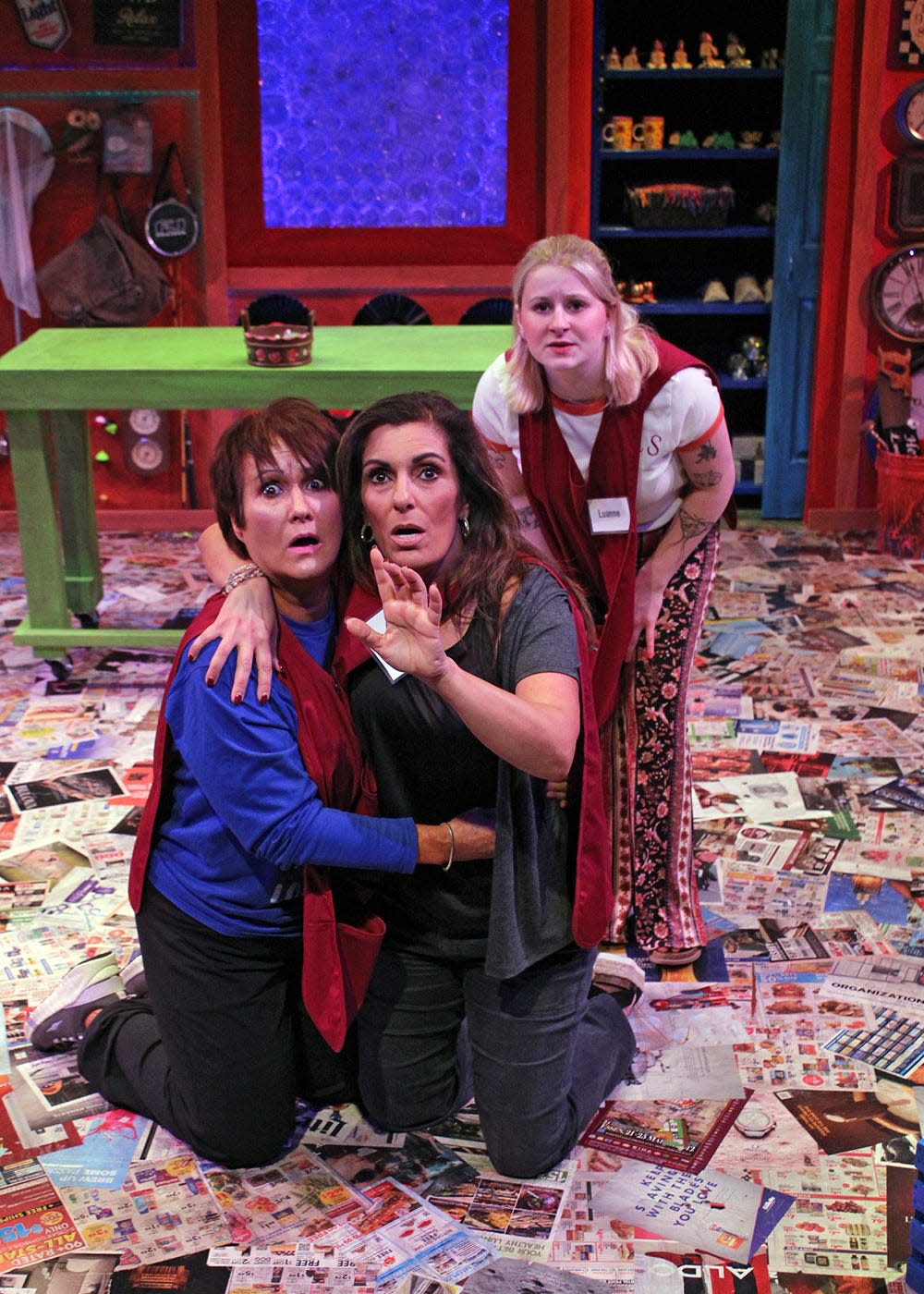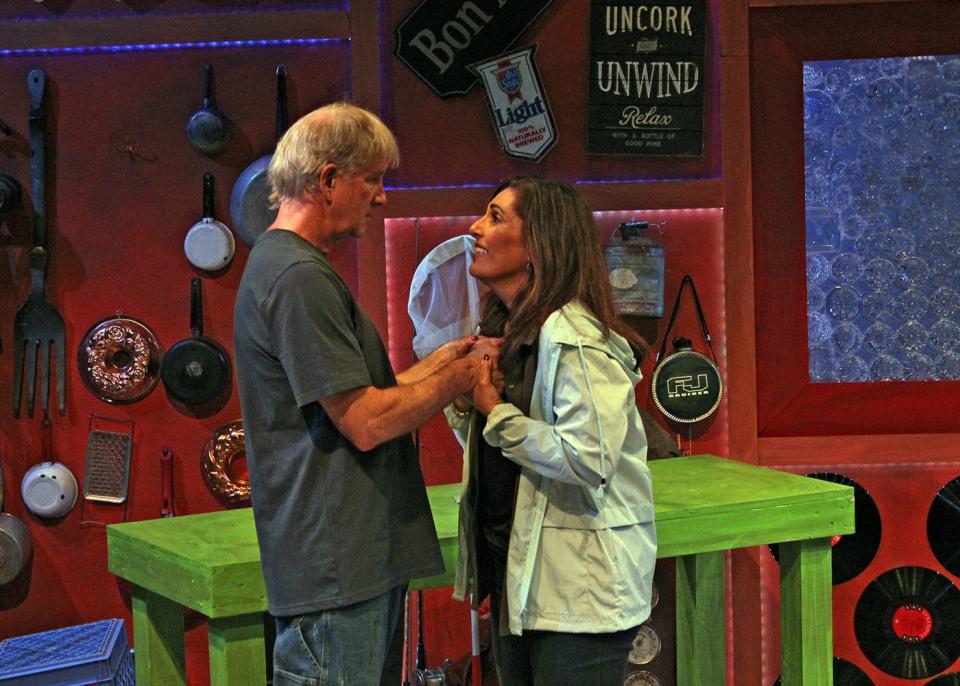Williamston Theatre's 'Be Here Now' about finding joy amid change in perspective

Correction: Bari is played by Sarab Kamoo. An earlier version of the story was incorrect.
Williamston Theatre closes its 2022-2023 season with a comedic play that asks audiences what price they are willing to pay for joy.
Previews for the Michigan premiere of Deborah Zoe Laufer’s “Be Here Now” begin on July 13 and performances run through Aug. 20.
Directed by Michigan State University Theater professor Rob Roznowski, the play features several Michigan favorites, including Sandra Birch, Sarab Kamoo and John Lepard, joined by newcomer Sophia Psiakis.
It’s a show that was scheduled to be on Williamston’s stage in 2020 but, like many others, was postponed because of the pandemic. Roznowski said he has been eager to direct “Be Here Now” because the message in it is so beautiful.
“It’s about finding joy in one’s life or changing one’s entire perspective by gaining knowledge and insight,” Rosnowski said. “This person goes from being a nihilist to someone who engages in life fully and is changing her world view and becoming hopeful.”
Bari is the play’s central character, a New York professor of nihilism who lost her job and had to return to her rural hometown. Given that she’s always been an angry, depressed misanthrope, this initially sends her into despair. But then unusual things begin to happen.

While connecting with some of the town’s quirky folks as she works at a local fulfillment center, she starts to have recurring headaches and seizures that manifest as bizarre, ecstatic, almost religious experiences. As she leans into the indescribable joy, she learns they are the result of a brain tumor that is killing her.
“The play is really about a choice of do I want to live happily for the first time with probably a much shorter lifespan — or if I get the tumor out, will I be able to remember these feelings and this joy that I haven’t felt before,” Roznowski said.
During the play, Bari, played by Kamoo, becomes friends with an artist who makes houses out of garbage, something that leads Bari to an epiphany about the world. The friendship also informs Roznowski’s vision of the show.
“You’ll see a lot of things that people would throw away and that this man sees beauty in,” Roznowski said. “He takes things that might have been destroyed or that some people consider garbage, and turns them into a thing of beauty — he can turn chaos into an artistic vision.”
Roznowski said he's enjoying working with the cast, all of whose work he was familiar with, including Psiakis, who is a recent graduate of the MSU theater program.
“It’s just the greatest rehearsal process that you could ever imagine,” Roznowski said.
When it came to creating the set, Roznowski and his team of designers took inspiration from the Heidelberg Project in Detroit. It is an outdoor art project using found objects to design homes in the city’s historically African-American Black Bottom area. Artist Tyree Guyton and his wife and grandfather created the project starting in 1986.
“That was the inspiration for the look of the show,” Roznowski said. “Monika Essen is the set designer and she has a really unique vision that comes onto the stage. What the audiences first will see is chaos, and then I hope they’ll see the organizational artistry of that.”
He said the team has also been working on what the seizures feel, sound and look like. The playwright included descriptions about how the seizures make Bari’s world brighter and how she sees auras and energy around people. It’s a challenge being met by lighting designer Brian M. Scruggs and sound designer Julia Garlotte.
Other crew members include costume designer Mona Johani, props designer and set dresser Kinza Parker and stage manager Adam Kruger. Johani is another recent graduate of the MSU Theater Department program, brought on as part of the partnership between Williamston Theatre and the MSU Department of Theater.
The play runs 80 to 90 minutes during which the audience pays witness to the change in the main character’s world view.
“It’s pretty amazing to see someone reconstruct themselves in front of you, but also, it’s really sweet and really funny,” Roznowski said. “That’s the beauty of (the play). It sounds like a heavy subject, but really it’s handled with such beauty and humor and Sandy Birch is hilarious and John Lepard is such a delight to watch him work.”
Williamston will host four shows with special consideration for those who have compromised immune systems. Masks are required for shows on July 14 show, Aug. 5 and Aug. 7 show. At other shows, masks are recommended, but not required.
If you go
What: “Be Here Now” by Deborah Zoe Laufer
Where: Williamston Theater, 122 S. Putnam Street, downtown Williamston
When: July 13 to Aug. 20, Thursdays through Sundays
Tickets: From $28 to $37, www.williamstontheatre.org or 1-517-655-SHOW
This article originally appeared on Lansing State Journal: Williamston Theatre's 'Be Here Now' about finding joy amid change in perspective

